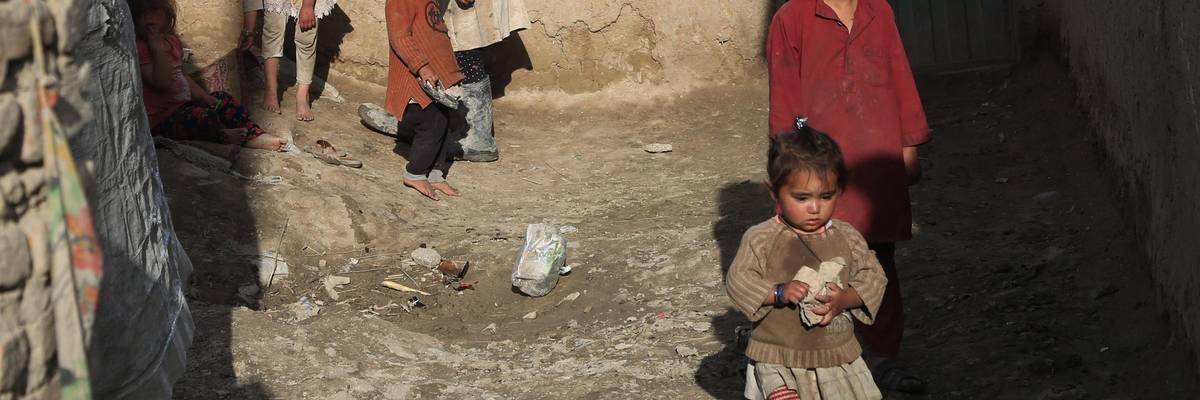

SUBSCRIBE TO OUR FREE NEWSLETTER
Daily news & progressive opinion—funded by the people, not the corporations—delivered straight to your inbox.
5
#000000
#FFFFFF
To donate by check, phone, or other method, see our More Ways to Give page.


Daily news & progressive opinion—funded by the people, not the corporations—delivered straight to your inbox.

Displaced children play at a refugee camp in Kabul, Afghanistan on April 16, 2021. (Photo: Rahmatullah Alizadah/Xinhua via Getty Images)
"After living through decades of fleeing and fighting, Afghans now face a severe drought which has devastated food production, leaving millions hungry and destitute."
--Alexander Matheou, IFRC
"After living through decades of fleeing and fighting, Afghans now face a severe drought which has devastated food production, leaving millions hungry and destitute," said Matheou. "We are deeply concerned that Afghanistan faces imminent collapse of health services and worsening hunger if aid and money do not flow into the country within weeks."
The IFRC noted that demands on the organization's workers in the country have intensified in recent weeks amid cuts to healthcare funding.
More than 20,000 healthcare workers in Afghanistan are no longer being paid and about 2,500 health facilities are currently not in operation due to the funding cuts, according to the AP.
The IFRC said $38 million is immediately needed "to support Afghan Red Crescent to deliver emergency relief and recovery assistance to 560,000 people in 16 provinces worst affected by severe drought and displacement."
"IFRC appeal funds will be used to help with sustainable water supplies, establishing more drought-resistant crops and revitalising livestock, while supporting critical income generation for those most at risk of spiralling poverty, including women and the elderly," said Matheou.
Dear Common Dreams reader, The U.S. is on a fast track to authoritarianism like nothing I've ever seen. Meanwhile, corporate news outlets are utterly capitulating to Trump, twisting their coverage to avoid drawing his ire while lining up to stuff cash in his pockets. That's why I believe that Common Dreams is doing the best and most consequential reporting that we've ever done. Our small but mighty team is a progressive reporting powerhouse, covering the news every day that the corporate media never will. Our mission has always been simple: To inform. To inspire. And to ignite change for the common good. Now here's the key piece that I want all our readers to understand: None of this would be possible without your financial support. That's not just some fundraising cliche. It's the absolute and literal truth. We don't accept corporate advertising and never will. We don't have a paywall because we don't think people should be blocked from critical news based on their ability to pay. Everything we do is funded by the donations of readers like you. Will you donate now to help power the nonprofit, independent reporting of Common Dreams? Thank you for being a vital member of our community. Together, we can keep independent journalism alive when it’s needed most. - Craig Brown, Co-founder |
"After living through decades of fleeing and fighting, Afghans now face a severe drought which has devastated food production, leaving millions hungry and destitute."
--Alexander Matheou, IFRC
"After living through decades of fleeing and fighting, Afghans now face a severe drought which has devastated food production, leaving millions hungry and destitute," said Matheou. "We are deeply concerned that Afghanistan faces imminent collapse of health services and worsening hunger if aid and money do not flow into the country within weeks."
The IFRC noted that demands on the organization's workers in the country have intensified in recent weeks amid cuts to healthcare funding.
More than 20,000 healthcare workers in Afghanistan are no longer being paid and about 2,500 health facilities are currently not in operation due to the funding cuts, according to the AP.
The IFRC said $38 million is immediately needed "to support Afghan Red Crescent to deliver emergency relief and recovery assistance to 560,000 people in 16 provinces worst affected by severe drought and displacement."
"IFRC appeal funds will be used to help with sustainable water supplies, establishing more drought-resistant crops and revitalising livestock, while supporting critical income generation for those most at risk of spiralling poverty, including women and the elderly," said Matheou.
"After living through decades of fleeing and fighting, Afghans now face a severe drought which has devastated food production, leaving millions hungry and destitute."
--Alexander Matheou, IFRC
"After living through decades of fleeing and fighting, Afghans now face a severe drought which has devastated food production, leaving millions hungry and destitute," said Matheou. "We are deeply concerned that Afghanistan faces imminent collapse of health services and worsening hunger if aid and money do not flow into the country within weeks."
The IFRC noted that demands on the organization's workers in the country have intensified in recent weeks amid cuts to healthcare funding.
More than 20,000 healthcare workers in Afghanistan are no longer being paid and about 2,500 health facilities are currently not in operation due to the funding cuts, according to the AP.
The IFRC said $38 million is immediately needed "to support Afghan Red Crescent to deliver emergency relief and recovery assistance to 560,000 people in 16 provinces worst affected by severe drought and displacement."
"IFRC appeal funds will be used to help with sustainable water supplies, establishing more drought-resistant crops and revitalising livestock, while supporting critical income generation for those most at risk of spiralling poverty, including women and the elderly," said Matheou.